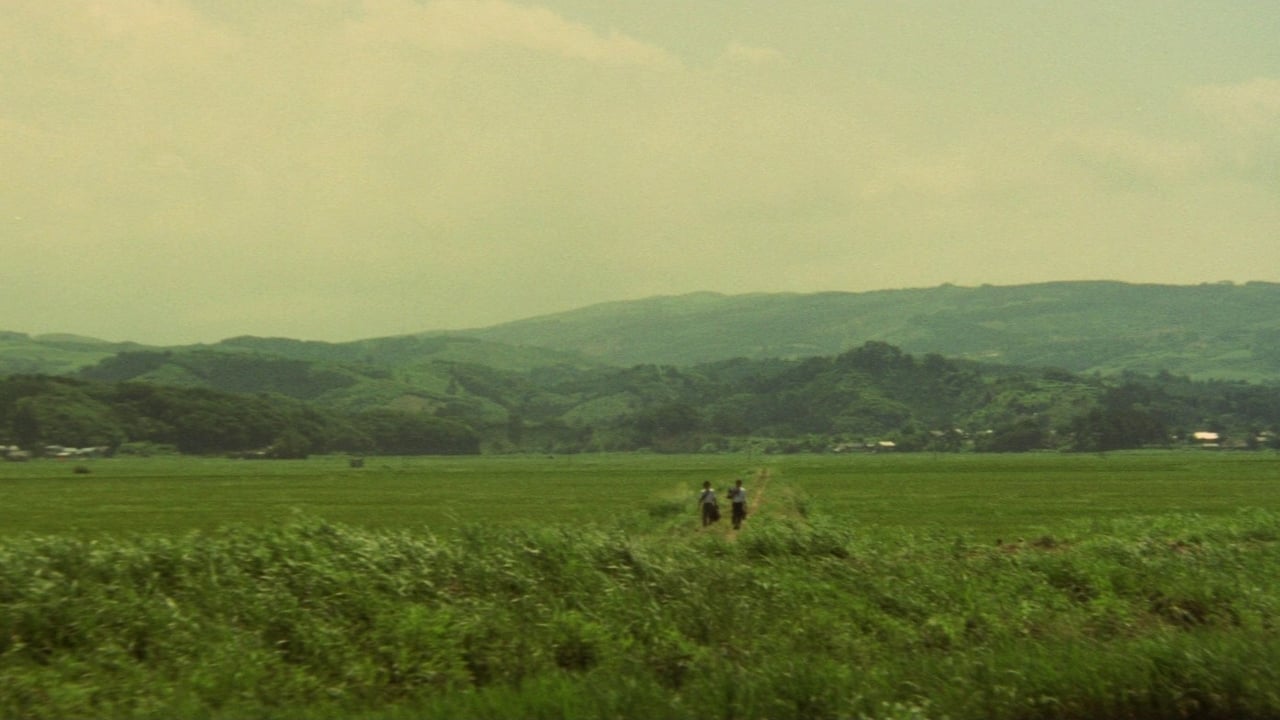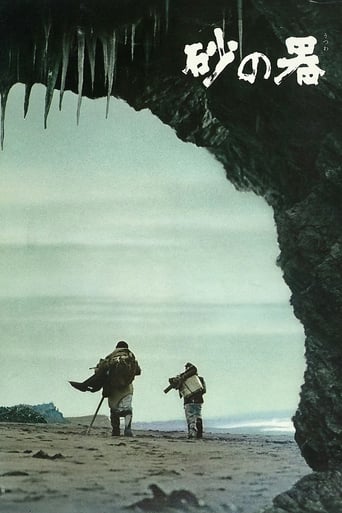

The Castle of Sand / Container of Sand (Lit.) (Suna No Utsuwa). Viewed on Streaming. Music = ten (10) stars; cinematography/lighting = eight (8) stars; subtitles/translations = six (6) stars. Director Yoshitarô Nomura again displays his fascination with crime mysteries, trains, and rural Japan (in a way, this film looks like a mini Honshu travelogue of many places tourists may never see). The Director's tale primarily comprises a mash up of: unrelenting, investigative work by homicide police detectives; the creation and performance (by a 60-member symphony orchestra) of a piano concerto; and the lingering prejudice against noninfectious leprosy suffers. Nomura uses a common plot device where seeming remote and unrelated events turn out to be tightly coupled. The film is too long. It loses it's dynamic punch when 20-30 minutes of symphonic music is inserted at the end of the film (it's just too much of a good thing and plot-point overkill). This brings a suspenseful final police evidence review meeting (prior to an arrest warrant being authorized and issued for the concerto's creator/ conductor) often to a stand still (there is much cross-cutting between the concert and the stalled review meeting). A poorly executed contrivance that almost sinks a heretofore well crafted suspense movie! (And far removed from, say, Hitchcock's symphonic suspense scenes in THE MAN WHO KNEW TOO MUCH (1934, 1956).) Acting is fine except for the histrionics of the fake conductor. Distinguished character actor Chishû Ryû makes a welcomed cameo (albeit crucial) appearance. Narrative in the form of on-screen text is surprisingly effective: it adds value as opposed to being a "quick and dirty" way to link disparate scenes during the editing process. Cinematography/lighting (wide screen, color) are excellent and include striking forward/reverse zoom shots. Original/adapted music is outstanding. Subtitles are occasionally a bit too long given their screen duration. Writings (of which many are shown on screen) are usually not translated. Same for many newspaper article subheadings. A cinematic treat. Highly recommended. WILLIAM FLANIGAN, PhD.
... View MoreCASTLE OF SAND is an engrossing, laid-back police procedural that captures your attention even when the plot seems fairly ordinary. A Tokyo cop (Tetsuro Tamba) is troubled when a retired cop is found brutally murdered, with no evidence save the vague recollections of a few townsfolk. At times, the story is reminiscent of a regional travelogue, but in learning more about Japan, Tamba hones in on a small set of likely suspects, but everyone is so agreeable that uncovering the truth becomes like rooting out the one hidden evidence of violence in a sea of potential data. Regrettably, the film unravels in the final forty or so minutes, when the remainder of the story is told with musical accompaniment of a famous pianist. The plot becomes frankly loses credibility and even becomes rather nonsensical. The movie changes mood and style, and dripping with melodrama.
... View MoreThe Film Society of Lincoln Center Presents A Special Retrospective of The 43rd New York Film Festival The Beauty of the Everyday: Japan's Shochiku Company at 110 September 24 October 20, 2005 This project is supported in part by an award from the National Endowment for the Arts, which believes that a great nation deserves great art. This year's New York Film Festival Retrospective The Beauty of the Everyday: Japan's Shochiku Company at 110 is virtually a pocket history of Japanese cinema. While some fifteen of the forty-five films in the retrospective are devoted to Japanese filmmaker masters, such as Ozu, Naruse, and Mizoguchi, more than two dozen of the films are by directors far less well-known in the West. The Castle of Sand / Suna no Utsuwa Yoshitaro Nomura, 1974; 140m Two detectives, Imanishi and Yoshimura, are assigned to the murder of a 60-year-old man whose body was found dumped in a railroad yard. It turns to be that of a former policeman, Miki; the murder now seems even more mysterious, as Miki was well liked by all and had been on holiday when he was killed. The detectives visit all the places to which Miki has traveled, with little luck, but then they read an account buried in a lengthy report of how Miki years before had befriended a destitute, leprous man and his young son. Amazingly, that boy had grown up to become Eiryo Waga, a rising star in the music world. Could such an eminent figure have anything to do with the murder? Sadly, Yoshitaro Nomura passed away this past April; for years one of Shochiku's most popular and reliable directors, he worked successfully in a variety of genres but especially made his mark with The Castle of Sand, based on a best-selling novel. A real delight, the film contains many of the classic features of the detective film the pairing of a veteran and a rookie, the investigation as a voyage of discovery, wonderfully eccentric supporting characters but under Nomura's sure direction they take on a whole new life. ONLY ONE Screening: Sun Sept 25: 9:00pm
... View MoreAt first, I thought this was going to be a standard murder-mystery story. A police detective doggedly pursues slim clues all over the map to find a murderer. However, when the events which led up to the crime are revealed through flashbacks, the story takes an emotional turn which even brings tears to the detective's eyes. Like most Japanese movies, it starts slowly but comes alive at the end. I recommend it.
... View More